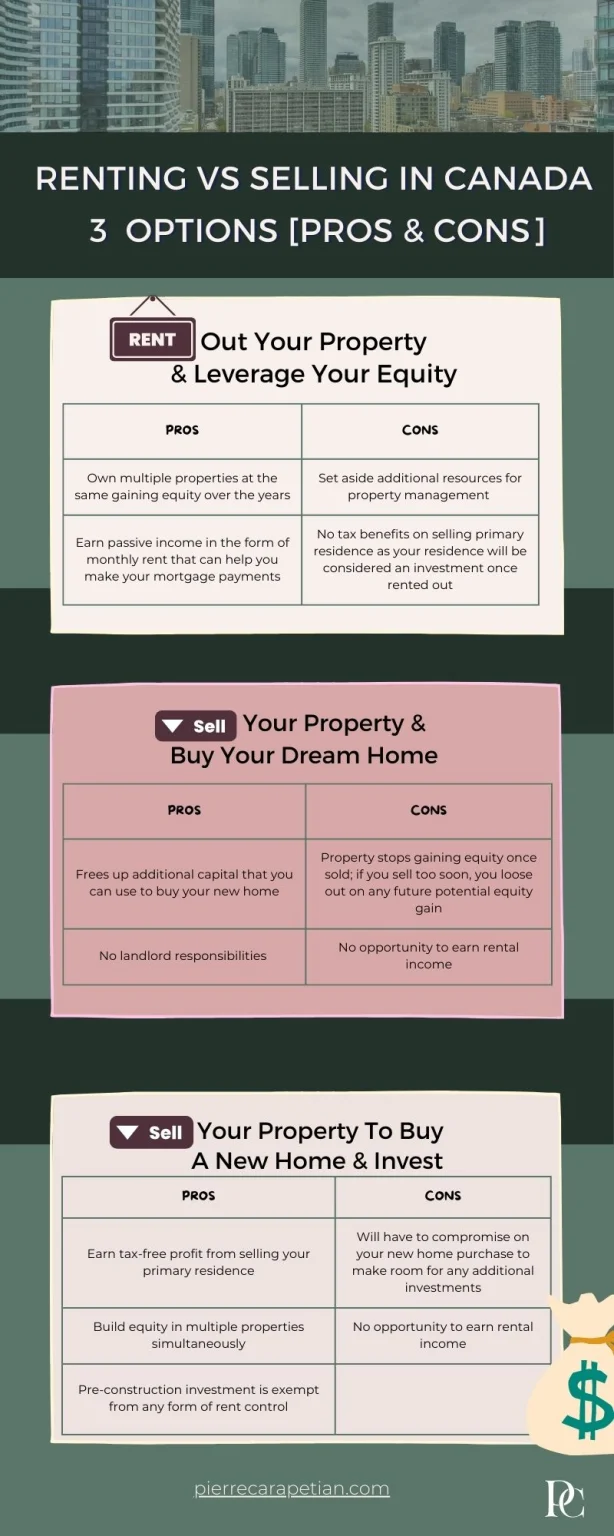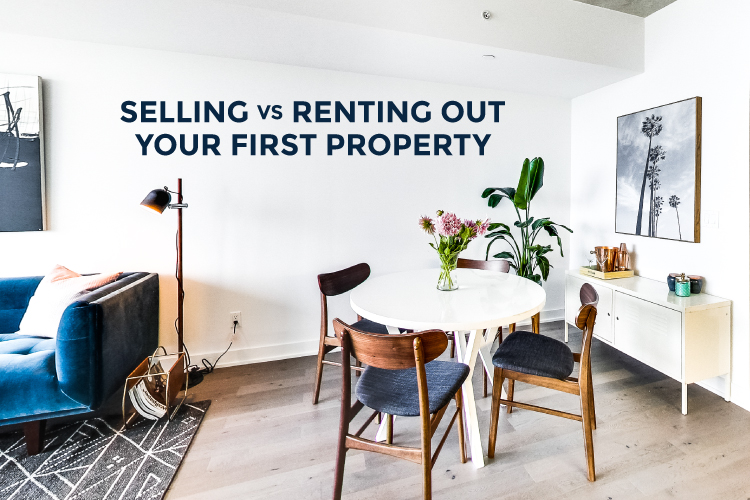Time travel to 10 years ago: it’s 2013 and you’ve bought a new home in Toronto. You’re feeling great to have had the wherewithal to pull this venture off. Fast forward ten years: you’ve since met the partner of your dreams and now your current home is no longer big enough for the two of you.
Table of Contents
You’re now ready to move up. But before you find your new home, you need to figure out what you’re going to do with your current home!
Should you enter the seller’s market looking to turn a profit or can you generate positive cash flow and passive income by renting out your existing property?
Well, that’s the conundrum and that’s why I am writing this blog to you give you a real estate agent’s perspective on the renting vs selling debate in Canada!
How To Navigate The Renting Vs Selling Conundrum
Should I Rent Or Sell My Property In 2024?
The best piece of advice I can give is to ask yourself what your long-term goals are. Once you figure that out, you should start looking at the housing market and the condo market to understand what the average property price is for the type of homes you like.
You may find that what you really want in your move-up home requires you to sell your condo to have more for a downpayment. If owning your dream home in 2024 is your top priority, then go for it!
If you’re looking to build serious wealth in real estate, you can look to rent a property that suits your lifestyle while also leaving you with enough capital for reinvestment.
Having a clear understanding of your financial situation and your long-term goals is a cheat code to succeed in real estate investing. I tell all my clients – if you start with a well-defined, clearly thought of goal, the rest of the pieces we can put into place!
Still Confused? Ask Yourself These Questions
As with all of real estate investing, there’s never a one size fits all answer. Before you decide between selling your condo versus renting out your condo as an investment, ask yourself a few questions:
-
How much do you still owe on your mortgage?
-
How much equity has your property generated?
-
Are you prepared to be a landlord?
-
What’s the property value of your current home?
-
How much could you likely rent your condo or home out for?
-
What type of move-up home are you in the market for?
These are just a few questions to help you look at the selling vs renting conundrum from a wide lens. If you don’t know the answers to these questions, you can book a call with a real estate agent, share your goals, and figure out a strategy that works best for you!
Alternatively, you can use one of the many online rent vs sell calculators to better understand the costs and returns of each strategy for your unique situation! But keep in mind, you’ll still need those variables like current market rent and a property valuation. These can be nuanced so enlisting the help of a top realtor can be helpful.
Now Here’s An Example
As an example, let’s say you bought a one-bedroom Toronto condo in 2013 for $400,000. Since then, assuming you’ve taken a 30-year mortgage term with a fixed interest rate of 4.5%, your remaining mortgage balance by 2023 would amount to approximately $227,000.
All the while the equity your condo has earned over the last 10 years has increased your property’s current market value (CMV) to $650,000.
In this example, the average year-over-year equity gains are 6.2%. While Toronto’s historic average is 5% per year, Toronto’s downtown condo market has performed slightly better in recent years with most properties gaining 9% equity y-o-y. There’s been a slight slowdown in the last two years – between 2021 – 2023 – due to the evolving market conditions!
See how downtown Toronto home prices have out-paced the historic average.
When’s The Best Time To Sell Your Property?
Toronto’s real estate market is busiest during the spring and fall months. It’s that time of the year when buyers flood the market and all the properties listed face high competition due to Toronto’s general lack of supply.
But if you’re looking to sell your home quickly, the busy months may not always be the best months. Listing your home for sale in the fall – between August and December – can make your property stand out. These months see fewer listings on the market which increases your chances of selling your home quickly at market value pricing.
Related: Yes, Spring Is The Best Time To Sell Your House In Toronto! But Why?
When’s The Best Time To Rent Out Your Property?
If I had to pick, August and September would be the best months to rent out your property in Canada. Toronto’s rental market is highly influenced by international students and their respective in-take. As a result, the months prior to the onset of a semester (be it spring, summer, fall, or winter semester) are the busiest and best months to look for tenants for your property.
Should You Rent Or Sell Your Home Or Condo: 3 Possible Outcomes [With Pros & Cons]

When faced with the sell or rent my home or condo conundrum, you have three possible outcomes:
Rent out your property and leverage the equity to buy a move-up property.
Sell your property outright and use the profits to buy the move-up home of your dreams.
Sell your property to buy a move-up home and use a portion of your profits to invest in a pre-construction condo.
1. Rent Out Your Home and Leverage Your Equity
As we discussed above, you can use the equity you’ve earned in your first home to put towards your move-up property and keep your condo as an investment property. Renting it out means you can take advantage of Toronto’s competitive rental market and high rental rates, however, you miss out on the property tax break you are entitled to when selling a principal residence.
Signs you should rent out your house:
- If you learn that there’s high demand for rentals in the neighbourhood where you own your property
- If you like the idea of being a landlord and are comfortable taking up all the additional responsibilities involved in property management
- If you’re emotionally attached to your home and don’t want to sell it for personal reasons
- If your property has the potential to generate positive cash flow which works as an additional passive income stream for you
Pros:
- You will have two properties generating equity.
- You have a tenant helping to pay down your mortgage.
Cons:
- You’re financially responsible for two properties.
- By turning your principal residence into an investment, you lose out on the tax breaks of selling your principal residence.
2. Sell Your Home and Buy Your Dream Home
If you decide to sell your condo at its current market value of $650,000 you would profit about $397,200 ($650K – mortgage balance of $252,800). An important advantage here is that when you sell your principal residence your profits are completely tax-free! So if you’re looking to go big or go home, choosing to cash in and sell your condo in this example means you can buy a home for up to $1,800,000 (generally speaking, but there are many factors a mortgage broker would consider).
Signs you should sell your home and buy your dream home:
- If on studying the market, you realize that you’re in a seller’s market, you may want to sell to capitalize on the high demand
- If you do not own a property that has the potential to earn positive cash flow (that’s rare in Toronto as it is)
- If you do not like the idea of being a landlord and do not want to take up additional property management responsibilities
- If you do not have enough capital to purchase your move-up / dream home
Pros:
- With that kind of cash, you can make a hefty downpayment on your move-up home.
- You don’t have to deal with the responsibilities of being a landlord.
Cons:
- You miss out on the equity gains and rental income of holding onto your condo.
3. Sell Your Home To Buy A New Home & Invest In Pre-Construction
If you have earned enough equity, it may be more valuable to sell your home and buy a move-up home that isn’t at the absolute top of your budget. This way you can use the remaining profits to reinvest into the pre-construction market, allowing you to generate equity right away without needing a mortgage for that property for a few years.
Sign you should sell your home and invest in pre-construction:
- If your goal is to build long-term wealth by building a sold real estate investment portfolio
- If you are willing to compromise on your dream home to make room for your investment
- If you’re not keen on taking on landlord responsibilities
Pros:
- You get full tax-free profits from selling your principal residence.
- You can build equity in your home and the pre-construction market.
- Your pre-construction investment will be exempt from rent control.
Cons:
- You may need to lower your budget for your move-up home to allow for funds to reinvest.
- You won’t have any rental income for three to four years
Download our FREE Guide to Investing in Pre-Construction Toronto Condos
Selling Vs Renting: How To Leverage Equity
One of the reasons why so many people are able to build wealth through real estate is the magical power of leverage. When you own a home, you’re able to borrow up to 80% of your home’s equity for a low-interest rate, known as a Home Equity Line of Credit or HELOC.
So if your condo’s current market value is $650,000 (the bank will determine the value), you’re able to borrow 80% of that value minus your outstanding mortgage. That leaves you with $267,200 to put towards a downpayment on your move-up home.
By borrowing the equity you could buy a home upwards of $1,300,000.
By using home equity to buy a second home, you are able to upgrade your living situation and have two properties generating equity for you.
The question you need to answer is this: now that you’ve earned a good amount of equity, can you do more with your equity by selling and reinvesting the funds or by holding the property and leveraging the equity? This is where the expertise and guidance of a professional real estate investor can help you.
Related: Turn Your Toronto Property Into a High-Grossing Real Estate Portfolio
Final Words
Do you own a Toronto condo that’s earned significant equity? If you want to discuss your financial situation, book a call with us and we can help create a customized action plan for your unique real estate investing goals.
Disclaimer: Pierre Carapetian Group Realty makes no warranty, express or implied, nor assumes any legal liability or responsibility for the accuracy, correctness, completeness, or use of the information provided. Opinions are based on our own calculations and fair market value is determined by us.


Pierre Carapetian
Pierre Carapetian is the Broker Of Record for Pierre Carapetian Group Realty with over 12 years of experience in the real estate market. As a proud Torontonian and real estate broker, he prides himself on knowing this city inside out. He started investing at the age of 18 and has facilitated over half a billion dollars in real estate transactions.


